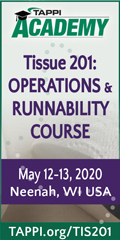
| Archive/Subscribe | TAPPI.org | Advertise | TAPPI Press Catalog | March 2020 |
China’s C&S Paper to Make Surgical Masks amid Coronavirus Outbreak
Chinese tissue paper and hygiene product manufacturer C&S Paper is setting up five surgical mask production lines as the coronavirus-hit country faces a severe shortage of medical gear. The company announced that it has obtained the license to produce and sell surgical masks, and has ordered five production lines with a total capacity of 350,000 masks per day for its Yunfu mill in Guangdong province. Production was expected to commence by the end of February. The company said the output will initially be for internal use, with any surplus to be offered on the market. It plans to eventually expand the capacity to about 2 million masks per day if needed. Other leading tissue paper and hygiene product producers, including Hengan International and the Taison Group, are also looking into mask production, though no details have been unveiled yet. Chinese healthcare authorities have been urging people to wear masks for self-protection since the coronavirus outbreak became a national concern in late January. Soaring demand from medical professionals and the public has caused a run on supplies around the world. The shortage has been acute as companies in China struggled to restart operations after the Lunar New Year holiday, which was extended by 10 days to February 9 to help slow the spread of the virus. Enterprises need to demonstrate that they have sufficient protective measures and resources, such has masks for staff, in order to obtain permission from local governments to resume normal operations. Masks, in particular surgical masks or N95 respirators which can block most particles and germs, are primarily composed of multi-layers of polypropylene nonwoven fabric. They need to be processed in a dust-free environment. Manufacturing facilities suitable for hygiene product producers and automakers, with existing dust-free workshops, are considered suitable for new mask production lines or for the refitting of assembly lines to make them. |


